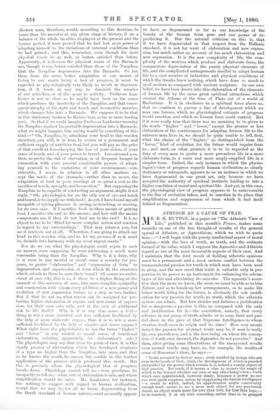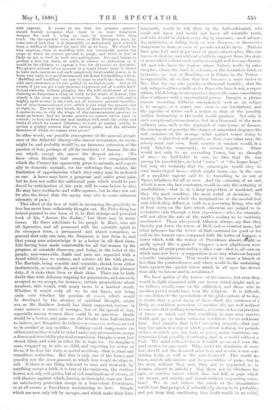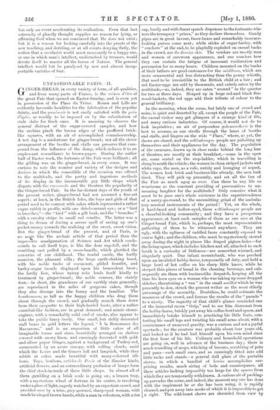ATHEISM AS A CAUSE OF FEAR.
R. R. H. HUTTON, in a paper on "The Atheistic View of
Life," published in this month's Fraser, makes some temarks on one of the less thought-of results of the general spread of Atheism, or Agnosticism, which we wish to quote here :—" I will begin with the purely intellectual aspect of moral opinion,—with the love of truth, as truth, and the estimate formed of its value, which I suppose the Agnostics and Atheists regard as one of the most favourable aspects of their case. And I maintain that the first result of holding atheistic opinions must be a permanent and a most serious conflict between the transcendental passion for truth in which men have been used to glory, and the new creed that truth is valuable only in pro-
portion to its power as an instrument for enhancing the advan- tages of life and alleviating its miseries. The agnostic's asser- tion that the more we know, the more we must be able so to bias Nature, and so to handicap her arrangements, so to make life better worth living for the future, is obviously the sole justifi- cation for any passion for truth, as truth, which the atheistic system can admit. But how slender and dubious a justification for so dangerous a passion is this, as compared with the only real justification for it,—the conviction, namely, that every advance in our grasp of truth admits us to some faint and par- tial share in the gaze of that Supreme Intelligence to whom creation itself owes its origin and its aims ! How very unsafe indeed the passion for abstract truth may be, if man is really his own providence, and is the first being on whom the concep- tion of truth ever dawned, the Agnostics do not perceive." And then, after giving some illustrations of the unexpected results even mental truths may have, as, for example, the results..of some of Rousseau's ideas, he says :—
" Truth revealed by God to men ; truth wielded by beings who are ever in the hands of God; truth, the development of which is guarded and guided by the power which reveals it, is, indeed a worthy object of high passion. But truth, if it means a clue to secrets the magic of which is far beyond whether our own or any other being's ken ; truth which once apprehended, however dimly, becomes a power no one can ever again suppress, unless by suppressing the human intelligence —a result to which, indeed, its apprehension might conceivably enough tend—seems to me a most unfit object for any passionate desire, an object ranch more for awe than love, for fear than hope,— to be touched, if at all, with trembling, rather than to be grasped
with rapture. It seems to me that tho genuine agnostic
should frankly recognise that there is no more dangerous weapon, for such a being as man to tamper with, than truth. On the agnostic view, we have, as Miss Bevington says, by some sort of luck that it is impossible to understand, been selected from a million of failures for such life as we have. We should be very cautious, then, in meddling with any inscrutable power, the scope of which we cannot pretend to gauge, and which is just as likely as not to hurl us back into nothingness. For such beings to profess a love for truth, as truth, is almost as ridiculous as it would be for children to express a love for dynamite as dynamite. The proper attitude of an agnostic in a world where truth is shown to have such enormous and such completely incalculable power, is to learn very early to control strenuously his desire for meddling with it. 'Meddling and muddling' are sure to come to much the same thing, with such creatures as we are, guided by no higher care. And at all events, if you can get a safe personal enjoyment out of a sober intel- lectual curiosity, without plunging into the wild excitement of pro- claiming so dangerous a thing as truth to the winds of heaven, that clearly is the most you ought to venture. To conjure with such a mighty spell as that, is the work, not of tentative agnostic humility, but of true transcendental faith, which is just what the agnostic has no right to. The very first result, then, of Agnosticism should be, as it seems to me, to clip the wings of this transceudental passion ; to make us beware how we invoke powers we cannot either trust or control ; to keep us from any rash dealings with truth the utility and limits of which we cannot calculate; to warn us against setting in motion a mighty current that we cannot guide, and the ultimate direction of which we cannot even guess."
In other words, one possible consequence of the general accept- ance of the Atheistic theory—the sincere acceptance, we mean, might be, and probably would be, an immense extension of the passion of fear, perhaps of all the incidents of human life the one which, except sin, causes the deepest misery. [We have often thought that among the few compensations which the Creator has apparently given to animals, and especi- ally to domestic animals, for the sufferings they endure, the limitation of apprehension which they enjoy may be reckoned as one. A horse may have a gangrene and suffer great pain, but he does not suffer the additional pain which would be pro- duced by anticipation of the pain still to come before he dies. He may have toothache and suffer agonies, but he does not suf- fer also the dread that the agony may rise to some unknown intensity of pain.] This effect of the loss of faith in increasing the proclivity to fear has never been sufficiently thought out. Mr. Percy Greg has indeed pointed to one form of it, in that strange and powerful book of his, "Across the Zodiac," but there may be many forms. He there attributes to his people in Mars, who are all Agnostics, and all possessed with the scientific spirit in its strongest form, a permanent and abject cowardice, so general that only one man, the Emperor, is free from it, and that young men acknowledge it as a factor in all their ideas.
Life having been made comfortable for all but women by the progress of scientific discovery, and being, in the belief of the
people, non-renewable, death and pain are regarded with a dread which rises to ecstacy, and colours all life with gloom.
The Martials, being sensible and scientific, shrink from either instinctively, as animals do, and will not perform the plainest duty, if it risks their lives or their skins. There can be little doubt that with Atheism reigning for generations, and sincerely accepted as we accept, for instance, certain propositions about numbers, this would, with many races, be a marked result. Whether it would with all we do not know, not being quite sure whether the passion of ennui, which would be developed by the absence of spiritual thought, might not, as Mr. Matthew Arnold has dimly suggested, become in some natures a cause of courage; but of the spread of fear, especially among women, there could be no question. Death would be a horror, and pain—as the Greeks were half-inclined to believe, and Bengalees do believe—a SUM171Itlit maiton, an evil
to be avoided at any sacrifice. Nothing could compensate for either, and neither would be risked under any provocation, except a direct and irresistible physical compulsion. Imagine a man just struck blind, and with no other life to hope for. Or imagine a man, wrapped up in wife or child, and expecting for either of them, if he does his duty, a mortal accident,—that is, final and remediless extinction. But this is only one of the forms, and possibly not the most general, in which fear would develope it- self. If there is one thing inherent in man and incurable by anything except a faith, it is fear of the unknown, the restless horror, not only evil spirits, but of evil combinations of events, of evil chances against which, having no foresight, man can have no satisfactory protection except in a benevolent Providence, or at all events a Providence maintaining its laws. Dreada which are now only felt by savages, and which make their lives
miserable, would be felt then by the half-cultivated, who could not know and would not know all scientific truth, and who would be shaken every day by rumours,—as of talvanc- ing epidemics, or failing food, or new diseases, or discoveries dangerous to man, or even of psendo-scientific facts. Nations have gone half mad in presence of great catastrophes, like out- bursts of cholera ; aud without a faith to support them, the state of nerve which follows such outbursts might well become chronic. All men who know the regions where Nature works by cata- strophes, where the land is volcanic, or the tornadoes fatal, or tyrannies—as now in Mandalay, or in France in the Terror— insupportable, all declare that fear becomes a main factor in life ; that for one who perishes a thousand tremble ; that the only refuge is either a faith or, for those who have it not, a super- stition, which brings in an imperfect degree the same consolatory idea of alliance with a supernatural power. Imagine a pheno- menon occurring hitherto uuexplaiued, such as an eclipse is to savages, or a comet was even to our forefathers, and the agonies of terror such a notion as that of the possibly sudden destruction of the world would produce. Not only iu such exceptional circumstances, but in a thousand of the more ordinary ones, such as the lipproach of some forms of disease, the coming-on of poverty, the chance of unmerited disgrace, the real sustainer of the average mind against terror rising to insanity is that God will provide, or that, come what may, the misery must end soon. Both sources of comfort would, in a
truly Atheistic community, be extinct together. There would not only be no overruling Power, but no thought of oue, — no half-belief in one, no idea that He was among the possibilities, no faint "trust " of "the larger hope," but only the certainty that the catastrophe would obey its own undeveloped laws,--which might mean, say, in the case of a mephitic vapour said to be travelling to us out of Space, blindness for all at once. And the certainty of an end, which is now the last comforter, would be only the certainty of annihilation,—that is, to a large proportion of mankind, and they the most sensitive, the most awful of destinies. The limit to the horror which the imaginations of the morbid feel, and which they diffuse, is faith in a governing Being, who will at least carry on the laws which otherwise are judged to be certainties only through a thin experieuce,—who, for example, will not allow the rate of the earth's cooling to be suddenly accelerated. Those who preach Atheism always say that they thereby put down the terror of Hell, and so comfort man ; but what influence has the terror of Hell exercised for good or for evil on the human race, compared with the terror of huiager, a terror which, with the notion of Providence absent, ght so easily spread like a panic ? Suppose a new phylloxera were attacking all grain protected by a silica coat—that is, all corn on which man now lives—a supposition in no way whatever beyond scientific imagination. That would not be more a breach of law than the potato-disease, and where would be the sustaining force against the special terror which in all ages has driven man alike to labour and to revolution ?
We have spoken of the terrors of the masses, but even they would be light compared with one terror which might, and, as we believe, would, conic on the cultivated, and those who in another period would have been the religious. It is difficult, as one listens to the speculations of the philosophers of to-day, to doubt that a good many of them think the existence of a Deity no condition precedent nr another life, are well inclined to conceive that nothing terminates, not even such a conjunction of forces as mind, and that something in man may survive death, and go on under unknown conditions for an unknown time. Just imagine that belief becoming general,— that you may live agaiu in a way of which you know nothing, for periods of time of which you can form no guess, under conditions un- determined, but possibly of suffering, and in a world without a God. The mind with a lesion in it might go on, and even the mad survive for ages mad. Why, under the dominion of mere law, should not the diseased mind last, and accrete a new con-
taining body, as well as the non-diseased ? This world we know, and its alleviations and its possibilities of pain ; but in
the next, without God, may they not be expanded, as in dreams, almost to infinity ? May there not be blindness for ages, or cureless cancer which does not kill, or pain which can mount, and mount, and mount without suspending sensa- tion? We do not believe the minds of the imaginative would bear that prospect, if scientifically shown to be probable ; and yet from that maddening idea death would be no relief,
but only an event accelerating its realisation. Even that last extremity of ghastly thought supplies no reason for lying, or affirming God when we are convinced that He does not exist ; but it is a reason for looking carefully into the proofs of the new teaching, and deriding, or at all events denying flatly, the notion that a secularist world must necessarily be a happy one, or one in which man's intellect, undisturbed by tremors, would devote itself to master all the forces of Nature. The general intellect would but be paralysed by new and almost insup- portable varieties of fear.




































 Previous page
Previous page